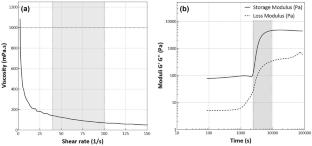Ambient Dual Cross-Linked Interpenetrating Polymer Hydrogel Networks: Synthesis, Characterization, and Potential for Wearable Biosensing Devices
Abstract
Interpenetrating polymer hydrogel networks (IPNs) present a significant advancement in the role of biomaterials with tailored properties for wearable sensors, particularly in developing non-invasive real-time monitoring devices for healthcare and fitness. This study investigates the synthesis processing and characterization of highly stretchable and elastomeric hydrogel IPNs, focusing on simplifying the synthesis by dual cross-linking of ionic and covalent polymeric backbones in ambient conditions. The hydrogels were tested for their rheological properties, mechanical behavior, and analyte sensitivity. Integrating these hydrogels into wearable sensors offers novel opportunities for continuous monitoring of physiological parameters and early detection of changes in health conditions. Rheology reveals shear thinning behavior and successful ambient cross-linking capabilities, while mechanical testing demonstrated remarkable stretchability and resilience even under cyclic tensile stress. The hydrogel's sensitivity and selectivity for biosensing were showcased with distinct responses to various analytes such as glucose, saline, and ion gradients. Further exploration and optimization of the synthesis parameters are essential for unlocking the full potential of these materials in biomedical and sensing applications, advancing personalized healthcare and disease monitoring.



 求助内容:
求助内容: 应助结果提醒方式:
应助结果提醒方式:


